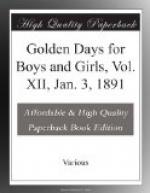It is not a fortunate translation to state that Jeroboam made priests of the lowest class of the people. It would have been poor policy, and would have brought his movement into disrepute.
The literal rendering of the Hebrew is “from the ends of the people,” and means, as in the Revised Version, “from all the people.”
Jeroboam would have been glad to have the priestly tribe, Levi, furnish him his priests, but they were loyal to God and the true worship and would not assist the king in his schism, so he had to get priests where he could from all the people and from any tribe.
In 2 Chron. 11: 13 it is said that the Levites in a body went over to Rehoboam. This greatly strengthened the king of Judah and tended to keep the religion of that part of the people pure.
NEW FEASTS APPOINTED.
“And Jeroboam ordained a feast in the eighth month, on the fifteenth day of the month, like unto the feast that is In Judah, and he offered upon the altar. So did he in Bethel, sacrificing unto the calves that he had made: and he placed in Bethel the priests of the high places which he had made.
“So he offered upon the altar which he had made in Bethel the fifteenth day of the eighth month, even in the month which he had devised of his own heart; and ordained a feast unto the children of Israel: and he offered upon the altar, and burnt incense.”
Jeroboam was the more anxious to get his religious enterprises established because the time for the feast of the tabernacles was coming on and many of his people would be going up to Jerusalem.
He therefore, as a part of his scheme, very shrewdly appointed a counter feast, putting it on the same day of the month, the fifteenth, because that was the time of the full moon, but he changed the month.
The right time was the seventh month, corresponding with our October and November, and it was the most joyous of all the festivals celebrating the gathering of the harvest.
He could plead a good reason for putting his feast a month later, because the harvest was slower ripening in the northern part of the kingdom than in the southern, and the change of time would be an accommodation. The law fixing the seventh month is given (Lev. 23: 34, 39, 41).
At this feast Jeroboam himself approached the altar and served as a priest. He did this doubtless for two reasons—1, To give the royal sanction to the new religion; and 2, To show that he considered himself the religious as well as the civil head of the nation.
LESSONS.
1. Seek first the kingdom of God and His righteousness. Jeroboam forgot this rule and put the improvement and fortifying of his kingdom first—his secular affairs—and as a result made a fatal mistake.
2. How long and far a sin reaches! Solomon’s idolatry bears fruit in the breaking up of the nation and the lapse of half of it into heathenism. What a disappointment to God, who had done and borne so much for this people!




